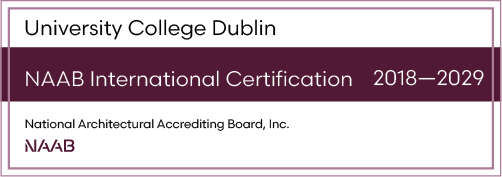The programme uses teaching, learning and assessment approaches such as individual and group design projects, live-projects, case students, scenario-based learning and written research and dissertations. Each has a focus on individual development and reflective learning, while developing effective group-work, written, verbal and visual communication and presentation skills
- Act competently and independently and have the ability to integrate knowledge and handle complexity, formulate judgments with incomplete or limited information, and to reflect on wider professional issues.
- Apply their knowledge and problem solving abilities to the design of an architectural project in response to functional brief and site conditions, including an understanding of social and physical contexts and show this in visual and written documents.
- Articulate their knowledge of local and global architectural history and precedent and have explicit in their work the ability to use such knowledge to inform future design and research work.
- Communicate and present their design and research questions and the knowledge and rationale underpinning their conclusions at public fora to professional and non-professional audiences, clearly and unambiguously
- Embed in their own work their knowledge of the regulatory and building control policy framework that underpins and influences practice and, be aware of the impact of such frameworks on current and future practice.
- Evidence an informed and independent view of the role of the architect and the value of architecture to society, communicate and articulate the potential of architecture with regard to quality of life, environmental performance and climate change, health and well-being, economy etc
- Integrate their knowledge of specialized research methods in architecture into their work and be capable of using such methods with rigour, depth and precision to understand, evaluate, and analyse scenarios in architectural theory, design and assembly.
- On successful completion of the programme students should be able to: Embed in their visual and written work evidence of their ability to use conceptual and critical thinking and know the appropriate use of both.
- Understand structural, environmental, envelope, services and life-saving systems to the extent that the student can clearly evidence their ability to synthesise these within a comprehensive building design programme.
- Use analogue and digital methods of visual communication, drawing, presentation, model making, and show judgment in utilising such methods appropriately in order to achieve their design intentions and ambitions
- Utilise a range of investigative and design skills, showing in their work their ability to use the appropriate skill at the appropriate stage and an ability to synthesise knowledge to achieve original and excellent design outcomes.
